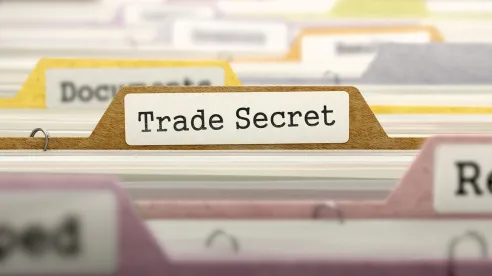As a direct result of the 2019 novel coronavirus (COVID-19) pandemic, employers nationwide have had to make the excruciating decision to terminate or furlough or lay off employees, some of whom may be subject to a non-compete agreement. These layoffs are often a business decision based on the economic crisis rather than the employee’s performance. Enforcement of non-compete agreements against laid-off or terminated employees can be difficult in any environment, but in the current climate of mass layoffs and high unemployment employers may face an even steeper climb.
In addition, the temptation for employees to misappropriate confidential information and trade secrets may also be at an all-time high. The economic downturn means employees may have greater incentive to misappropriate competitive data the employee believes will be valuable at a future job. Meanwhile, employee loyalty and morale may be in short supply due to anticipated pay cuts or layoffs. Combined, these conditions create a perfect storm of risk for employers who need to take extra care to protect their competitive intelligence.
ENFORCING NON-COMPETE AGREEMENTS IN THE COVID-19 ENVIRONMENT
Before seeking to enforce a non-compete in the current environment and, preferably, before deciding to terminate or lay off an employee subject to such an agreement, consider the following five questions:
1. Is your organization’s non-compete enforceable under state law?
States apply different, often very stringent, tests for determining whether a non-compete agreement is enforceable. For instance, under Wisconsin law, courts are to construe restrictive covenants liberally in favor of the employee, and a non-compete must:
-
Be necessary for the protection of the employer
-
Provide a reasonable time restriction
-
Provide a reasonable territorial limit
-
Not be harsh or oppressive to the employee
-
Not be contrary to public policy
In a period of economic crisis and layoffs, courts may be apt to apply already employee-favorable rules of construction in a manner that favors unenforceability. During the pandemic, or in normal times, enforceability is a threshold issue on which you should seek counsel before threatening or pursuing a claim against the employee.
2. Is a non-compete enforceable against laid-off or terminated employees?
Depending on the state, even if your non-compete is generally enforceable under state law, it may not be enforceable against an employee who was laid off or terminated. Some states do not allow employers to enforce non-competes against employees who were laid off or terminated without cause. In other states, the nature of or circumstances surrounding the termination is just one non-dispositive factor in the enforceability analysis.
3. Have you demanded compliance?
If you are concerned that a departing employee will breach or has breached his or her non-compete, you should send the employee a written demand that he or she honor their agreement as a preliminary matter. Even if a demand for compliance is ignored, the court will want to know that you attempted resolution and made efforts to enforce your rights before filing suit.
4. Can you avoid litigation by meeting the terminated employee half-way?
In recognition of these unprecedented times, you may wish to work with the terminated employee and his or her new employer to implement necessary and reasonable limitations that allow the employee to keep his or her new job and avoid the need for court intervention.
Whether or not you are even willing to consider such an agreement hinges first and foremost on whether you can live with partial enforcement of a non-compete for any given former employee. Additionally, if a compromise can be reached, make clear you are not waiving the right to enforce the restrictive covenants to other employees—lest other departed employees later claim waiver based on a fact-specific, COVID-19 accommodation.
5. Are you likely to obtain injunctive relief?
Assuming your non-compete is enforceable, and you need to pursue an enforcement action, consider how swiftly you need to act to protect your business’ interests. If harm caused by breach of a non-compete will be “irreparable”—i.e., a harm for which delayed relief will be futile, such as when sensitive information is at risk of disclosure—you may want to seek an injunction at the outset to prevent the departed employee’s new employment. However, courts weigh irreparable harm to the employer against hardship to the employee when addressing requests for injunctive relief.
During the COVID-19 pandemic, expect that employees will argue particularly acute hardship due to job scarcity, even in the face of an enforceable non-compete. This same argument should be expected even where the employer does not seek emergency relief, but nevertheless pursues its former employee for damages resulting from breach of a non-compete. The current pandemic clearly bears on the likelihood of success and ultimately may be dispositive, whereas the same case would be won by the employer in different times.
Even in this environment, though, employers should not hesitate to seek enforcement where there is tangible evidence of misappropriation or other harm, such as prohibited solicitation of customers or an employee departure that involves the taking of sensitive data. That evidence will greatly enhance the possibility of achieving injunctive relief, as courts should, in any environment, seek to deter harmful contractual violations and intentional wrongdoing.
PROTECTING CONFIDENTIAL INFORMATION AND TRADE SECRETS
Protecting competitive intelligence is also key at this time. A few simple steps can help prevent or, in the worst case, limit the fallout from a departing employee’s theft. If you have valuable competitive intelligence and are planning terminations or layoffs, plan in advance as follows:
1. Obtain control over sensitive data
In the lead-up to an employee’s layoff or termination, obtain any necessary credentials to log into accounts that employee controlled. For instance, if the employee ran your cloud-based client management software, ensure you also have access to the platform, as well as any data logged by the employee. Additionally, as soon as the departure is effective, restrict the employee’s access to all data. Typically, the quickest and most effective way to do this is to have an IT administrator take control of the employee’s accounts.
2. Demand return of confidential information and trade secrets
Issue a written demand to the departing employee to return all employer-issued property, including confidential information and trade secrets, and remind the departing employee that he or she cannot retain or use any copies. If such obligations are already included in the restrictive covenant agreement, or if “confidential” and “trade secret” information is defined in the restrictive covenant agreement, specifically reference those provisions in the demand.
3. Investigate suspicious behavior
If you suspect a departing employee of wrongdoing, consider examining the departing employee’s pre-departure activities. This can be accomplished with the assistance of your IT team or, alternatively, with the assistance of an outside vendor specializing in e-forensic investigation. Look for any abnormal or suspicious behavior, such as: copying of files, use of a personal jump drive or even simply unusual access of sensitive files.
4. Implement an immediate hold on departing employee’s tech
If there is suspicion or evidence of theft, all the devices used by the employee should be kept as-is, and not repurposed or reassigned to another employee. Preservation is necessary because any deletions, wiping or further use of the devices will impede e-forensic analysis (which is often required in litigation).
5. Take action
If you discover theft, take action. At a minimum, make a written demand for return of your stolen data and consider putting the employee’s new employer on notice of the theft. Courts remain open and most do not take kindly to data theft, even in the COVID-19 environment. While you may be able to recover information through informal self-help, it is critically important that you swiftly act to shutdown known theft, including involving the courts when necessary.





 />i
/>i

